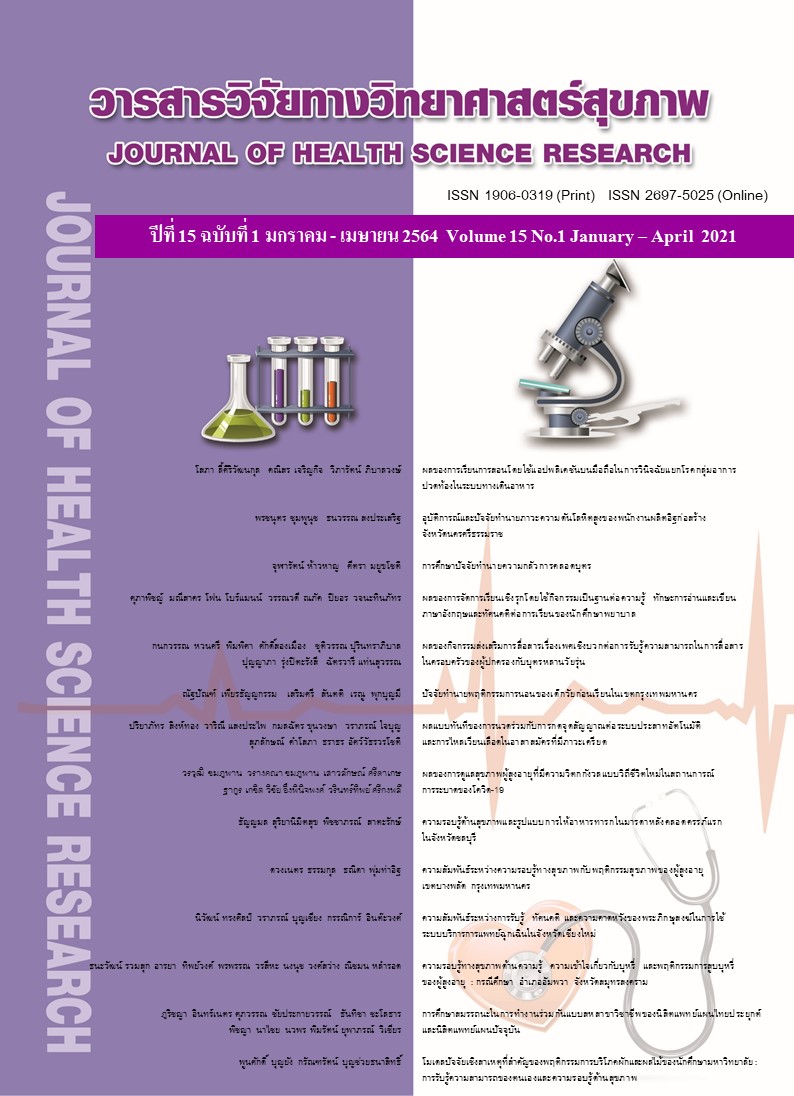ความสัมพันธ์ระหว่างความรอบรู้ทางสุขภาพ กับพฤติกรรมสุขภาพของผู้สูงอายุ เขตบางพลัด กรุงเทพมหานคร
Main Article Content
บทคัดย่อ
บทนำ : การก้าวเข้าสู่สังคมผู้สูงอายุส่งผลกระทบหลายด้านโดยเฉพาะ การเกิดโรคเรื้อรัง และมีความต้องการพึ่งพิงเพิ่มมากขึ้น การที่จะควบคุมความรุนแรงของโรคเรื้อรัง และส่งเสริมให้ผู้สูงอายุดูแลตนเองด้านสุขภาพได้มีประสิทธิภาพ คือ การมีพฤติกรรมสุขภาพที่เหมาะสม และมีความรอบรู้ทางสุขภาพที่ดี จะนำไปสู่การตัดสินใจในการดูแลสุขภาพตนเองที่มีประสิทธิภาพ
วัตถุประสงค์การวิจัย : เพื่อศึกษาระดับความรอบรู้ทางสุขภาพ และพฤติกรรมสุขภาพ และความสัมพันธ์ของระดับความรอบรู้ทางสุขภาพกับพฤติกรรมสุขภาพของผู้สูงอายุ
วิธีการวิจัย : ตัวอย่าง คือ ผู้สูงอายุจาก 48 ชุมชนในเขตบางพลัด กรุงเทพมหานคร สุ่มตัวอย่างแบบง่ายได้มา 6 ชุมชน จากนั้นเลือกตัวอย่างแบบบังเอิญ จำนวน 393 คน เก็บรวบรวมข้อมูลโดยใช้แบบประเมินความรอบรู้ทางสุขภาพ และพฤติกรรมสุขภาพ มีค่า IOC เท่ากับ .95 และ .90 ตามลำดับ ค่าสัมประสิทธิ์
แอลฟาครอนบาคเท่ากับ .96 และ .84 ตามลำดับ วิเคราะห์ข้อมูลใช้สถิติบรรยาย และทดสอบความสัมพันธ์ด้วยสัมประสิทธิ์สหสัมพันธ์แบบเพียร์สัน
ผลการวิจัย : ตัวอย่างส่วนใหญ่มีระดับความรอบรู้ทางสุขภาพอยู่ในระดับสูง ร้อยละ 86.12 มีพฤติกรรมสุขภาพอยู่ในระดับดี ร้อยละ 89.90 พบว่า ความรอบรู้ทางสุขภาพมีความสัมพันธ์ทางบวกระดับปานกลางกับพฤติกรรมสุขภาพอย่างมีนัยสำคัญทางสถิติที่ .01 (r=.77, p<.01)
สรุปผล : แม้จะพบว่ามีความรอบรู้ทางสุขภาพระดับสูงและพฤติกรรมสุขภาพดี แต่ผู้สูงอายุต้องเผชิญความเสี่ยงในเรื่องความเฉื่อยทางปัญญา เนื่องจากความเสื่อมถอยของระบบร่างกาย ดังนั้น จึงมีความจำเป็นในการสร้างเสริมความรอบรู้ทางสุขภาพให้เหมาะสมกับวัย และต้องพัฒนาให้คงอยู่ตามสถานการณ์ที่เปลี่ยนแปลงตลอดเวลา
Downloads
Article Details
บทความที่ได้รับการตีพิมพ์เป็นลิขสิทธิ์ของวิทยาลัยพยาบาลบรมราชชนนี จังหวัดนนทบุรี
ข้อความที่ปรากฏในบทความแต่ละเรื่องในวารสารวิชาการเล่มนี้เป็นความคิดเห็นส่วนตัวของผู้เขียนแต่ละท่านไม่เกี่ยวข้องกับวิทยาลัยพยาบาลบรมราชชนนี จังหวัดนนทบุรี และคณาจารย์ท่านอื่น ในวิทยาลัยฯ แต่อย่างใด ความรับผิดชอบองค์ประกอบทั้งหมดของบทความแต่ละเรื่องเป็นของผู้เขียนแต่ละท่าน หากมีความผิดพลาดใด ๆ ผู้เขียนแต่ละท่านจะรับผิดชอบบทความของตนเองแต่ผู้เดียว
เอกสารอ้างอิง
Kaeodumkoeng K, Thummakul D. Health literacy promoting in aging population. Journal of Health Science Research. 2015;9(2):1-8. (in Thai).
Prasartkul P. Situation of the Thai Elderly 2015. Bangkok: Foundation of Thai Gerontology Research and Development Institute; 2016. (in Thai).
Palumbo R. Sustainability of well-being through literacy, the effects of food literacy on sustainability of well-being. Agric Agric Sci Procedia. 2016;8:99-106. doi: 10.1016/j.aaspro.2016.02.013.
Kimberly AK, Melody SG, William DM, Christopher RC, Richard TG. Effect of cognitive dysfunction on the relationship between age and health literacy. Patient Educ Couns. 2014;95(2):218–25. doi: 10.10 16/j.pec.2014.02.005.
Ramphaiboon P, Charoensup R, Sunsern R, Kanthawee P. Effectiveness of the developing health literacy focusing on herbal and herbal product program among elderly people with hypertention at MAE-CHAN district, Chiangrai province. Chiangrai Medical Journal. 2018;10(1):81-92. (in Thai).
Lin SC, Chen IJ, Yu WR, Lee SYD, Tsai TI. Effect of a community-based participatory
health literacy program on health behaviors and health empowerment among community-dwelling older adults: A quasi-experimental study. Geriatr Nurs. 2019; 40(5):494-501. doi: 10.1016/j.gerinurse.2019. 03.013.
Crespo TS, Andrade JMO, Lelis DF, Ferreira AC, Souza JGS, Martins, AME, et al. Adherence to medication, physical activity and diet among older people living with diabetes mellitus: Correlation between cognitive function and health literacy. IBRO Reports. 2020;9:132-7. doi: 101016/j.ibror.2020.07.003
Reisi M, Javadzade SH, Heydarabadi AB, Mostafavi F, Tavassoli E, Sharifirad G. The relationship betweenfunctional health literacy and health promoting behaviors among older adults. J Educ Health Promot. 2014;29(3):119. doi: 10.4103/2277-9531.145925.
MacLeod S, Musich S, Gulyas S, Cheng Y, Tkatch R, Cempellin D, et al. The impact of inadequate health literacy on patient satisfaction, healthcare utilization, and expenditures among older adults. Geriatri Nurs. 2017;38(4):334-41. doi: 10.1016/j.ge rinurse.2016.12.003.
Division of Public Health and Environmental Strategy. Report of the elderly in Bangkok from the population base in the civil registration system as of December 2018. Bangkok: Strategy and Evaluation Department; 2019. (in Thai).
Yamane T. Statistics: An Introductory Analysis. 3rd Ed. New York: Harper and Row Publications; 1973.
Nutbeam D. Health literacy as a public health goal: A challenge for contemporary health education and communication strategies into the 21st Century. Health Promot Int. 2000;15(3):259-67. doi: 10.1 093/heapro/15.3.259.
Sørensen K, Van den Broucke S, Fullam J, Doyle G, Pelikan JM, Slonska Z, et al. Health literacy and public health: A systematic review and integration of definitions and models. BMC Public Health. 2012;12(1):80 doi: 10.1186/1471-24 58-12-80.
Walker SN, Sechrist KR, Pender NJ. The health-promoting lifestyle profile: Development and psychometric characterizations. Nurs Res. 1987;36(2):76-81. doi: 10.1097/00 006199-198703000-0002.
Best JW, Kahn JV. Research in education (10th ed.). New Delhi: Prentice-Hall of India Publications; 2006.
Haesum LKE, Ehlers LH, Hejlesen OK. The long-term effects of using telehomecare technology on functional health literacy: results from a randomized trial. Public Health. 2017;150:43-50. doi: 10.1016/j.puhe.2017.05.002.
Dinh TTH, Bonner A, Clark R, Ramsbotham J, Hines S. The effectiveness of the teach-back method on adherence and self-management in health education for people with chronic disease: a systematic review. JBI Database System Rev Implement Rep. 2016;14(1):210-47. doi: 10.11124/jbisrir-2016-2296.
Xu C, Furuya-Kanamori L, Liu Y, Færch K, Aadahl M, Seguin RA, et al. Sedentary behavior, physical activity, and all-cause mortality: dose-response and inten sity weighted time-use meta-analysis. J Am Med Directors Assoc. 2019;20(10):1206-12. doi: 10.1016/j.jamda.2019.05.001.
Rojer AGM, Ramsey KA, Trappenburg MC, van Rijssen NM, Otten RHJ, Heymans MW, et al. Instrumented measures of sedentary behaviour and physical activity are associated with mortality in community-dwelling older adults: A systematic review, meta-analysis and meta-regression analysis. Ageing Res Rev. 2020;61:101061. doi: 10.1016/j.arr.2020.1 01061.
Bampton EA, Johnson ST, Vallance JK. Profiles of resistance training behavior and sedentary time among older adults: Associations with health-related quality of life and psychosocial health. Prev Med Rep. 2015;2:773-6. doi: 10.1016/j.pmedr.2015.08.017.
Zadworna M. Healthy aging and the University of the Third Age – Health behavior and subjective health outcomes in older adults. Arch Gerontol and Geriatr. 2020;90:10
doi: 10.1016/j.archger.2020.104126.
Simpson V, Xu D. Difficulties with health self-management by older adults: The role of well-being. Geriatric Nurs. 2020;41(6): 984-91. doi: 10.1016/j.gerinurse.2020.07.010.
Wu F, Sheng Y. Social support network, social support, self-efficacy, health-promoting behavior and healthy aging among older adults: A pathway analysis. Arch Gerontol Geriat. 2019;85:103934. doi: 10.1016/j.arch ger.2019.103934.
Kim J, Lee HY, Won CR, Barr T, Merighi JR. Older adults’ technology use and its association with health and depressive symptoms: Findings from the 2011 national health and aging trends study. Nurs Outlook. 2020; 68(5):560-72. doi: 10.1016/j.outlook.2020.05.001.
Giena VP, Thongpat S, Nitirat P. Predictors of health-promoting behaviour among older adults with hypertension in Indonesia. Int J Nurs Sci. 2018;5(2):201-5. doi: 10.1016/j.ijnss.2018.04.002.


